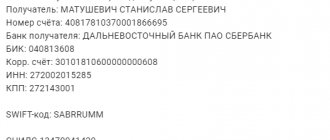Concept
First of all, we note that in tax legislation quite a lot of attention is paid to the characteristics of interdependent persons, the relationships between them, as well as the tax consequences of their transactions. The reason is that it is much easier for interconnected companies, individual entrepreneurs and ordinary individuals to illegally reduce their tax burden or evade taxes altogether through various manipulations.
The legal concept of interdependent persons in tax legislation is contained in paragraph 1 of Article 20 of the Tax Code of the Russian Federation. And so, interdependent persons for tax purposes are individuals and/or companies, the relationship between which may affect:
- conditions of their activities;
- economic results of their activities;
- economic results of the activities of the persons they represent.
More specifically, interdependent persons are recognized if one of the following conditions is present (clause 1 of Article 20 of the Tax Code of the Russian Federation):
- The company directly/or indirectly participates in another company, and the total share of such participation is from 20%. As for the share of indirect participation through a sequence of other organizations, it is calculated as the product of the shares of direct participation of some firms in others.
- A person is subordinate to another person due to the official hierarchy.
- Marriage/kinship relations (by blood and by nature), adoption, guardianship on the basis of the family legislation of the Russian Federation.
Let us note that the listed interdependent persons in tax legal relations have this status a priori. That is, upon compliance with one of these three criteria.
At the same time, on the basis of clause 2 of Art. 20 of the Tax Code of the Russian Federation, interdependent persons are recognized by the court for tax purposes. Moreover, he is not limited to the specified three criteria, but can choose his own basis, not specified in the Tax Code. In practice, this happens when relationships between persons can influence the results of transactions for the sale of goods, works, and services.
EXAMPLE
The Federal Tax Service found, and the court supported, the conclusion that the company and its counterparty are interdependent entities under the Tax Code of the Russian Federation, since their founders are the same people, in whose interests the interaction of both businesses and the establishment of favorable terms of purchase and sale (information letter of the Presidium of the Supreme Arbitration Court RF dated March 17, 2003 No. 71).
The Tax Code of the Russian Federation has another more detailed definition of who interdependent persons are in tax law. According to him, this is when the characteristics of relationships between persons can influence:
- conditions and/or results of transactions between them;
- and/or the economic results of its activities or the persons represented.
Chapter 14.1 of the Tax Code of the Russian Federation consistently and in detail reveals what interdependent persons mean. For example, what kind of influence are we talking about? So, it can occur when:
- participation of one person in the capital of others;
- on the basis of an agreement concluded between the parties;
- when otherwise possible, determine the decisions made by others.
The law especially emphasizes: such influence can be exerted by one person directly and independently, or together with its interdependent companies, individual entrepreneurs, and individuals.
Paragraph 2 of Article 105.1 of the Tax Code of the Russian Federation lists the main (most common) conditions for recognizing persons as interdependent. Among them:
- one company directly and/or indirectly participates in another, and the share is from 25%;
- an individual directly and/or indirectly participates in the organization, and the share is from 25%;
- the same person directly and/or indirectly participates in organizations, and the share in each is from 25%;
- a company and a person (including an individual together with its interdependent persons) can appoint/elect a sole executive body or at least 50% of the collegial executive body, board of directors (supervisory board);
- companies whose sole executive bodies or at least 50% of the collegial executive body, board of directors (supervisory board) are appointed or elected by decision of the same person (individuals together with their interdependent persons);
- companies in which 50% of the collegial executive body or board of directors (supervisory board) are the same individuals together with their interdependent persons;
- legal entity and its sole executive body;
- the powers of the sole executive body in different companies are exercised by the same person;
- companies and/or individuals, if the share of direct participation of each previous person in each subsequent organization is from 50%;
- one person is subordinate to another by position;
- spouse, parents (including adoptive parents), children (adopted), full and half brothers and sisters, guardian (trustee) and ward.
The relationship between mutual dependence and controllability in tax law: nuances
So, a transaction involving interdependent entities may have legal consequences if it is recognized as controlled. This will mean that the Federal Tax Service will pay close attention to it and study it for unreasonable understatement or overestimation of amounts transferred from one entity to another. Deviations in transaction prices between related parties can be used:
- to understate the tax base in order to reduce tax amounts;
- overstatement of the tax base for the purpose of calculating a larger deduction.
By controlling the transaction, the Federal Tax Service has the right to ensure the correctness of tax calculations:
- at a profit;
- Personal income tax (for individual entrepreneurs);
- MET;
- VAT.
How transactions between related parties take place can be found here.
The criteria for recognizing transactions as controlled are specified in Art. 105.14 Tax Code of the Russian Federation.
You can view these criteria here.
In turn, in paragraph 4 of Art. 105.14 of the Tax Code of the Russian Federation contains criteria for non-recognition of transactions as controlled. It is useful to pay attention to the letter of the Federal Tax Service dated November 2, 2012 No. ED-4-3/18615. In it, the department warns taxpayers that it will:
- control any transactions of interdependent persons that give rise to talk about the establishment of non-market prices in contracts for the purpose of tax evasion;
- Conduct desk audits using methods for identifying unjustified tax benefits of the payer in accordance with the norms of Chapter. 14.3 Tax Code of the Russian Federation.
In practice, this may mean additional assessment of taxes in the manner established by Chapter. 14.2 of the Tax Code of the Russian Federation (in particular, based on clause 5 of Article 105.3 of the Tax Code of the Russian Federation). However, if the taxpayer decides to challenge such activities of the Federal Tax Service in court, he has a good chance of defending his position. The fact is that the Supreme Court of the Russian Federation, in its decision No. AKPI15-1383 dated February 1, 2016, actually established that the Federal Tax Service does not have the necessary powers to verify prices set by related parties in uncontrolled transactions.
When a transaction with residents of offshore zones is controlled, ConsultantPlus experts explained. Get free trial access to the system and move on to the Ready-made solution.
Similar assessments of the actions of the Federal Tax Service can be found in other judicial precedents.
Report in 2022
A kind of report on related parties is submitted to the tax authority as part of the Notification of Controlled Transactions. The form of notification of controlled transactions and the procedure for filling it out are approved by Order of the Federal Tax Service of Russia dated May 7, 2018 No. ММВ-7-13/249.
The interdependence factor is reflected in Section 1A of this form:
Notification of controlled transactions for the past period is submitted only once a year - no later than May 20 of the following year (Clause 2 of Article 105.16 of the Tax Code of the Russian Federation). If May 20 falls on a weekend and (or) a non-working holiday, the period is extended until the next working day (Clause 7, Article 6.1 of the Tax Code of the Russian Federation). You must report for 2022 no later than May 20, 2022.
Report on controlled transactions
Agreements between organizations and/or citizens between whom special relationships have been identified are under special control of the Federal Tax Service and are carefully checked.
The company is obliged to send a message to the tax service at the place of registration about the conduct of a controlled transaction. The deadline for notification is until May 20 of the year following the one in which the agreement was drawn up (Article 105 of the Tax Code of the Russian Federation). If the deadline for sending information is violated, a fine of 5,000 rubles may be imposed on the enterprise. (Article 129 of the Tax Code of the Russian Federation), and for a leading official - a fine of 300 rubles. up to 500 rub. (Article 15 of the Administrative Code).
Information is sent in the form of a special notification in the approved form (Order of the Federal Tax Service of the Russian Federation No. ММВ-7-13/524, July 27, 2012) in one of the following ways: in paper form or in electronic form.
Affiliates: differences
It is important to understand that affiliates and interdependent entities have their differences. Thus, not a word is said about the former in the Tax Code of the Russian Federation. In addition, kinship and family relationships do not affect affiliation in any way, unlike interdependence.
Affiliates are more of a term from corporate law, which plays a big role only within the framework of antitrust law, as well as in the accounting and banking fields.
Who can be recognized as affiliated persons and for what purposes is stated in the RSFSR Law of March 22, 1991 No. 948-1 “On competition and restriction of monopolistic activities in commodity markets.”
Standard interdependence
Formal (or “standard”) signs of interdependence are clearly stated in paragraph 2 of Article 105.1 of the Tax Code of the Russian Federation and do not raise any special questions. The most important of them:
- direct or indirect participation of one organization in another with a share of more than 25%;
- participation of an individual in an organization with a share of more than 25%;
- two organizations, if the same person owns a share of more than 25% or performs the functions of the sole executive body (SEO);
- one person is subordinate to another by official position;
- close relatives.
There is a second group of signs, referred to in the law as “other grounds”. Let's call them “non-standard”.
Transactions
As a general rule, the price in a transaction is considered to correspond to the market until the contrary is proven (Clause 1, Article 40 of the Tax Code of the Russian Federation). At the same time, transactions between interdependent persons are always under special scrutiny by tax authorities, since the law directly allows for checking the adequacy of prices in transactions between such persons (Clause 2 of Article 40 of the Tax Code of the Russian Federation).
Thus, the main tax risks of transactions between related parties in 2022 lie in the area of their pricing policy. In the event of an inspection, inspectors will compare the established prices with transactions in which:
- the parties do not depend on each other;
- connections do not affect the economic results of the transaction.
Tax debts from price manipulation in transactions between related parties The Tax Code of the Russian Federation allows collection only in court based on the results of an audit by the Federal Tax Service (subclause 4, clause 2, Article 45 of the Tax Code of the Russian Federation).
Keep in mind: almost all transactions between related parties are controlled. Moreover, a number of other transactions are equated to them. This issue is regulated in detail by Art. 105.14 Tax Code of the Russian Federation.
Ultimately, recognition of persons as interdependent entails that taxes will have to be paid not on the actual income, but on the income that could have been received, but this was prevented by the commercial or financial conditions of the interdependent transaction (clause 1 of Article 105.3 of the Tax Code of the Russian Federation).
Unusual interdependence
The legislator left the list of criteria for interdependence open (clause 7 of article 105.1 of the Tax Code of the Russian Federation).
You will ask why? Because the formal criteria described in Art. 105.1 of the Tax Code of the Russian Federation do not always reflect the real relationships between persons. For example, relatives or organizations seem to formally depend on each other, but are in bad relations, or rather there are no relations between them, and then it turns out that they have nothing to show. And the opposite situation also happens - formally, persons do not depend on each other in any way, but are in such “good” relationships that they conduct joint business. In this regard, companies founded by these persons may be considered interdependent.
In other words, the list of criteria is open; the court can “believe” any circumstances identified by the tax authority.
Let's look at cases where interdependence matters for tax purposes.
Loan
Please note that loans between related legal entities may or may not be controlled transactions. In both cases, you just need to notify the tax authorities about them as part of the Notification (see above).
Thus, there are no risks when there is an interest-free loan between interdependent legal entities - namely Russian companies. Due to changes in tax legislation, from January 1, 2022, such transactions are not subject to control (new subparagraph 7, paragraph 4, article 105.14 of the Tax Code of the Russian Federation, as well as letter of the Ministry of Finance dated March 23, 2017 No. 03-03-RZ/16846).
According to the letter of the Federal Tax Service dated April 13, 2022 No. ED-4-13/6968, an interest-free loan between interdependent persons is not subject to tax control if the place of their registration or residence of all parties and beneficiaries is Russia. The date of conclusion of the contract (additional agreement to it) does not matter.
In other situations - when the rate on a controlled loan is very low or 0% - tax authorities may require that unearned interest be included in income according to the market rate (for example, letter of the Ministry of Finance dated May 27, 2016 No. 03-01-18/30778). And vice versa: when the rate is above the maximum, the borrower can cut costs by amounts in excess of the market interest rate (clause 1.1 of Article 269 of the Tax Code of the Russian Federation).
Additional negative consequences of interdependence
Transactions between related parties are not only subject to close monitoring by tax authorities.
Interdependence can greatly limit a person's rights. How? For example, an individual may be limited in the right to a property tax deduction if transactions are carried out between close relatives.
There is also a similar rule for legal entities - the right to benefits does not apply to interdependent organizations. For example, according to paragraph 25 of Art. 381 of the Tax Code of the Russian Federation, an exemption from property tax cannot be applied if it is acquired from an interdependent company.
Another example is the impossibility for a taxpayer to fully take into account interest on loans issued by an interdependent foreign creditor on the basis of clause 2 of Article 269 of the Tax Code of the Russian Federation.
In some cases, tax authorities reclassify relationships from debt to investment.
Settlement
Any accountant and lawyer should know how to carry out netting between interdependent parties, so as not to later run into accusations of receiving an unjustified tax benefit. Judicial practice shows that tax authorities mostly win in such disputes (for example, resolution of the Arbitration Court of the North-Western District dated May 26, 2017 No. F07-4431/2017 in case No. A42-23/2016).
Here's what you need to take into account if you want to set off between dependent parties (Article 410 of the Civil Code of the Russian Federation):
- there are counter homogeneous demands to each other;
- at least 2 different agreements have been signed between the parties, in one of which the counterparty is the debtor, and in the other, the creditor;
- the date of execution of the counter-similar claim has already arrived/has not been specified in the contract/determined by the moment of demand;
- Early offset is permissible, but only if this is expressly provided for by law.
How to identify tax risks of interdependence of legal entities
The Tax Code of the Russian Federation identifies three ways to recognize persons as interdependent:
- by force of law (part 2 of article 105.1);
- by independently recognizing themselves as interdependent (part 6 of Article 105.1);
- on the basis of a court decision (part 7 of article 105.1).
Timely identification of tax risks allows you to prepare for a tax audit. Therefore, we recommend that you pay attention to the following facts:
- the presence of common founders in several companies;
- location of companies at the same address;
- opening accounts in one bank;
- family ties;
- 2-NDFL data on workers employed in several companies;
- financial interdependence (guarantee, targeted financing);
- the presence of both general and special taxation regimes.
It is also advisable to analyze transactions for the composition of participants, conditions, amounts of income and expenses based on the results of contract execution, economic benefits and profitability.
The fact of interdependence itself does not confirm the existence of a tax offense. If the tax authority does not prove that the actions of a group of persons are aimed at reducing the tax burden, the tax will not be assessed.
Collection of tax debts from an interdependent twin
Tax authorities can use the presence of informal signs of interdependence not only for the purpose of confirming tax schemes, artificially fragmenting a business, or understating the tax base through the unreasonable use of tax benefits.
Tax authorities can compensate for damage (tax arrears, penalties, fines) at the expense of third parties dependent on the debtor. Such recovery is carried out within the limits of the proceeds received by the interdependent company or the value of the property transferred to it. Subclause 2, clause 2, Article 45 of the Tax Code of the Russian Federation The Supreme Court of the Russian Federation, the Supreme Court of the Russian Federation, dated September 16, 2016 No. 305-KG16-6003, defined the criteria for “other dependence » persons whose presence the tax authorities must prove in court, justifying the possibility of applying Art. 45 Tax Code of the Russian Federation:
- the coordinated nature of the actions of the taxpayer and other persons;
- impossibility of fulfilling tax obligations by the taxpayer as a result of these actions, including in the absence of interdependence established by Art. 105.1 Tax Code of the Russian Federation.
In this case, the tax authority was unable to collect a large tax debt because the company ceased operations. In fact, all employees and clients ended up in the new legal entity. The Supreme Court of the Russian Federation supported the courts that in this case there is a combination of circumstances in the form of the creation of a new entity shortly before the end of the tax audit of the old one, identity of contacts, transfer of employees, etc. The transfer of the property base did not allow the former legal entity to fulfill its obligation to pay taxes. The court ordered the new legal entity to pay taxes. Similar decisions were made in cases with a similar plot in the decisions of the Moscow District Court of July 19, 2019 No. F05-958/2018; AS of the Moscow District dated March 28, 2019 No. F05-569/2019; AS of the North Caucasus District dated October 3, 2019 No. F08-8272/2019; AS of the Ural District dated December 20, 2019 No. F09-7953/19
It was not possible to leave in English.
Responsibility for relationships between interdependent persons
The Federal Tax Service's control over transactions concluded between related parties is determined by the likely impact on the activities of the dependent party.
The tax office takes into account interdependence in the process of collecting arrears on the accounts of dependent persons. In this situation, documentary evidence of the transfer to a person of a share of the proceeds or assets of the taxpayer is required.
Mutual dependence is used by representatives of the Federal Tax Service as an effective tool that allows them to identify a decrease in the tax base or the unlawful use of property tax benefits.
Individuals and legal entities engaged in interdependent relationships may face certain risks.
- The Federal Tax Service has the right to recognize counterparties as interdependent if the taxpayer, in order to obtain an unjustified tax benefit, manipulates prices in a transaction or tries to artificially make it uncontrollable. However, this is only possible if there is evidence of unjustified benefit.
- Additional taxes are likely to be assessed if related parties conducted a transaction at prices below market prices.
- When the amount of taxes paid decreases, the Federal Tax Service adjusts the tax bases. In this case, additional accruals are carried out according to the principle of symmetry. The cost of the transaction is adjusted for counterparties simultaneously, as a result of which the amount of tax for one of the parties may decrease, and for the other, on the contrary, it may increase.
- Failure to pay tax or payment of it in full due to non-market prices appearing in transactions entails a fine of 40% of the unpaid tax amount. The minimum value of this amount is 30,000 rubles.
- Providing false information in a notification regarding controlled transactions, as well as unauthorized failure to provide such a notification, entails a fine of 5,000 rubles.
- To a person who acts as a seller in a transaction, the Federal Tax Service has the right to charge additional mineral extraction tax, VAT, as well as personal income tax on business activities in the event that the second counterparty is not obliged to pay tax.
In order to avoid liability, the taxpayer must provide evidence of the use of market prices in the transaction or the conclusion of a pricing agreement.
The concept of the category of interdependent persons
Individuals and legal entities are considered interdependent, the relationships between which are determined according to the results of transactions. The Tax Administration considers interdependence to be a negative feature when it, in combination with other factors, hints at the recognition of a tax unjustified benefit.
According to representatives of the tax service, interdependent relationships may indicate that the taxpayer is aware of violations committed by his counterparty, but he does not take any measures.
During inspections, inspectors pay increased attention to the search for interdependent persons.
Most transactions between related parties are controlled (for this they must meet certain criteria). They must be notified to the Federal Tax Service annually before May 20 of each calendar year .
Controlled, uncontrolled and equivalent to controlled transactions
Controlled transactions are transactions with the total annual turnover of both counterparties exceeding 60 million rubles. One participant meets any of the following conditions:
- works according to the general taxation system
- pays mineral extraction tax (the subject of the contract is one of the extracted minerals)
- connected to the Skolkovo innovation center
- exempt from income tax
- uses unified agricultural tax or UTII (in this case, the annual turnover of the parties to the transaction exceeds 100 million rubles)
Do not belong to controlled transactions:
- if interdependent persons are calculated according to the simplified tax system
- between interdependent organizations exempt from the obligation to pay income tax
- for a total amount not reaching 1 billion rubles for 1 calendar year
In addition, there are a number of transactions that are considered controlled:
- transactions where one of the counterparties is a resident of the states and territories listed in Order of the Ministry of Finance dated November 13, 2007 No. 108n, or its permanent representative in the Russian Federation
- foreign trade transactions with a total annual income exceeding 60 million rubles, carried out on certain goods: precious metals and stones, petroleum products, non-ferrous and ferrous metals, as well as mineral fertilizers
- transactions involving intermediaries without limiting the amount of income
What is required to approve a transaction?
The general director has the right to carry out transactions and manage legal entities in an unlimited number. Risks are likely only when non-market prices are set in transactions.
In the event that the general director is not the sole management body, he is obliged to provide detailed information about the legal entities in which he holds a leadership position to all other participants in the company. In this case, the transaction must be approved by the general meeting of non-interested participants.
In paragraph 7 of Art. 45 of the Federal Law of 02/08/1998 No. 14-FZ “On Limited Liability Companies” states that transactions can be approved by the board of directors if their amount does not exceed 2% of the value of all property owned by the company.
Subject to the conditions typical for transactions between unrelated individuals and/or legal entities, transactions that are carried out between interdependent counterparties are not illegal.
These conditions include:
- transaction cost
- rules for transfer of goods
- payment deferment
- installment payment
- insurance rules
The tax authorities are only interested in transactions carried out under non-market conditions, as a result of which one of the parties incurs excess costs and receives less income.





